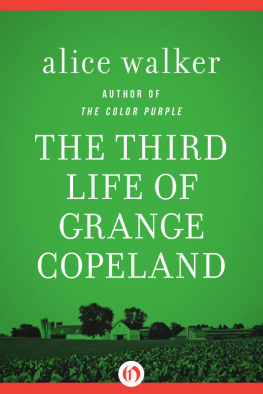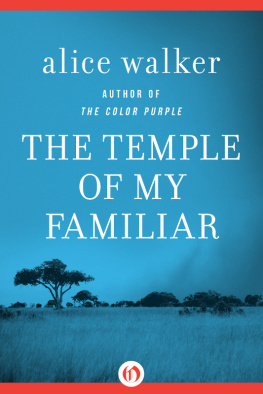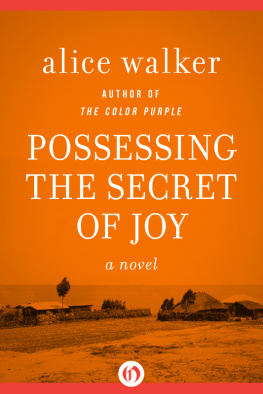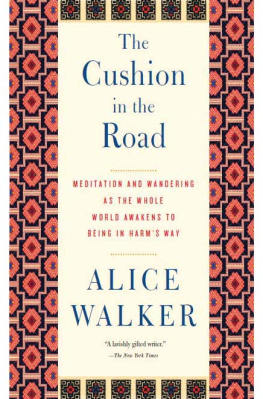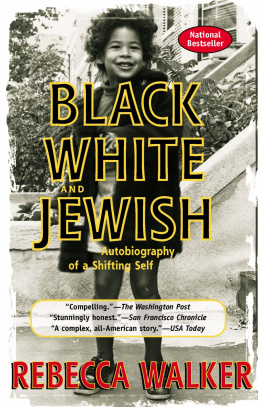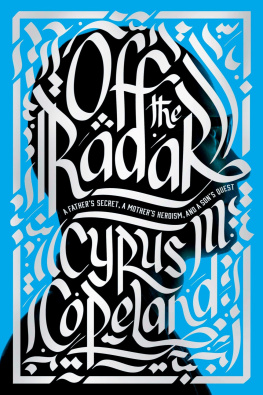Alice Walker - The Third Life of Grange Copeland
Here you can read online Alice Walker - The Third Life of Grange Copeland full text of the book (entire story) in english for free. Download pdf and epub, get meaning, cover and reviews about this ebook. year: 2011, publisher: Open Road, genre: Detective and thriller. Description of the work, (preface) as well as reviews are available. Best literature library LitArk.com created for fans of good reading and offers a wide selection of genres:
Romance novel
Science fiction
Adventure
Detective
Science
History
Home and family
Prose
Art
Politics
Computer
Non-fiction
Religion
Business
Children
Humor
Choose a favorite category and find really read worthwhile books. Enjoy immersion in the world of imagination, feel the emotions of the characters or learn something new for yourself, make an fascinating discovery.
- Book:The Third Life of Grange Copeland
- Author:
- Publisher:Open Road
- Genre:
- Year:2011
- Rating:4 / 5
- Favourites:Add to favourites
- Your mark:
- 80
- 1
- 2
- 3
- 4
- 5
The Third Life of Grange Copeland: summary, description and annotation
We offer to read an annotation, description, summary or preface (depends on what the author of the book "The Third Life of Grange Copeland" wrote himself). If you haven't found the necessary information about the book — write in the comments, we will try to find it.
The Third Life of Grange Copeland — read online for free the complete book (whole text) full work
Below is the text of the book, divided by pages. System saving the place of the last page read, allows you to conveniently read the book "The Third Life of Grange Copeland" online for free, without having to search again every time where you left off. Put a bookmark, and you can go to the page where you finished reading at any time.
Font size:
Interval:
Bookmark:


For my mother,
who made a way out of no way
And for Mel, my husband
Sometimes I had an intense desire to cry because of something my father said, but instead, because life, cynicism, had taught me to put on a mask, I laughed. For him, I did not suffer, I felt nothing, I was a shameless cynic, I had no soul because of the mask I showed. But inside, I felt every word he said.
MANUEL, IN The Children of Sanchez
BY OSCAR LEWIS
O, my clansmen
Let us all cry together!
Come,
Let us mourn the death of my husband,
The death of a Prince
The Ash that was produced
By a great Fire!
O this homestead is utterly dead,
Close the gates
With lacari thorns,
For the Prince
The heir to the Stool is lost!
And all the young men
Have perished in the wilderness!
SONG OF LAWINO,
A LAMENT BY OKOT PBITEK
The great danger, Richard told Sartre, in the world today is that the very feeling and conception of what is a human being might well be lost.
RICHARD WRIGHT TO JEAN-PAUL SARTRE,
IN Richard Wright BY CONSTANCE WEBB
BROWNFIELD STOOD CLOSE to his mother in the yard, not taking his eyes off the back of the receding automobile. His Uncle Silas slowed the car as it got to a place where a pointed rock jutted up out of the road: a week before he had busted an oil pan there. Once past this spot, which he had cursed as he passed to and fro over it during the week, he stuck out his arm and waved jauntily back at them. Brownfield waved sadly, his eyes blurred with tears. His Aunt Marilyn, not visible through the rear window of the car, waved a dainty blue handkerchief from her front window. It fluttered merrily like a pennant. Brownfields cousins had their faces pressed to the rear window, and their delicate, hard-to-see hands flopped monotonously up and down. They were tired of waving, for they had been waving good-bye since they finished breakfast. The automobile was a new 1920 Buick, long and high and shiny green with great popping headlights like the eyes of a frog. Inside the car it was all blue, with seats that were fuzzy and soft. Slender silver handles opened the doors and rolled the astonishingly clear windows up and down. As it bumped over the road its canvas top was scratched by low elm branches. Brownfield felt embarrassed about the bad road and the damage it did to his uncles car. Uncle Silas loved his car and had spent all morning washing it, polishing the wheel spokes and dusting off the running board. Now it bounced over gullies and potholes in the road, tossing Uncle Silas and his wife and children up in the air and slamming them down again. Brownfield sighed as the sound of metal against rock reached his ears. The road was for mules, wagons and bare feet only.
A wagond be easier, said his father.
But not nearly bout as grand as that. His mother looked after the car without envy, but wistfully.
Brownfield watched the automobile as it turned a curve and was finally out of sight. Then he watched the last of the dust settle. Already he missed his cousins, although they made him feel dumb for never having seen a picture show and for never having seen houses stacked one on top of the other until they nearly reached the sky. They had stayed a week and got over being impressed by his small knowledge of farming the first day. He showed them how to milk the cow, how to feed the pigs, how to find chickens eggs; but the next day they had bombarded him with talk about automobiles and street lights and paved walks and trash collectors and about something they had ridden in once in a department store that went up, up, up from one floor to the next without anybody walking a step. He had been dazzled by this information and at last overwhelmed. They taunted him because he lived in the country and never saw anything or went anywhere. They told him that his father worked for a cracker and that the cracker owned him. They told him that their own daddy, his Uncle Silas, had gone to Philadelphia to be his own boss. They told him that his mother wanted to leave his father and go North to Philadelphia with them. They said that his mother wanted him, Brownfield, to go to school, and that she was tired of his father and wanted to leave him anyway. His cousins told Brownfield this and much more. They bewildered, excited and hurt him. Still, he missed them; they were from a world he had never seen. Now that they were gone he felt the way he usually felt only in winter, never in June; as if he were waiting for something to happen that would take a very long time to come.
I wish we lived in Philydelphia, he said.
Well, we dont. That was his father.
Brownfield looked at Grange with surprise. His father almost never spoke to him unless they had company. Even then he acted as if talking to his son was a strain, a burdensome requirement.
Uncle Silas like to talk about his automobile, said Brownfield, his lips bumbling over the word. It was his uncles word, a city word. In the country they always said car. Some people still called them buggies, as if they could not get used to a conveyance that did not use horses.
I wish we had a automobile like that!
Well, we dont.
No, we dont, said Margaret.
Brownfield frowned. His mother agreed with his father whenever possible. And though he was only ten Brownfield wondered about this. He thought his mother was like their dog in some ways. She didnt have a thing to say that did not in some way show her submission to his father.
We ought to be thankful we got a roof over our heads and three meals a day.
It was actually more like one meal a day. His mother smiled at Brownfield, one of her rare sudden smiles that lit up her smooth, heart-shaped face. Her skin was rich brown with a creamy reddish sheen. Her teeth were small and regular and her breath was always sweet with a milky cleanness. Brownfield had hands like hers, long, thin aristocratic hands, with fingers meant for jewels. His mother had no wedding ring, however.
Brownfield listened to the familiar silence around him. Their house was at the end of the long rugged road that gave his uncles car so much trouble. This road looked to be no more than a track where it branched off from the main road, which was of smoothly scraped dirt. The road scraper, a man on a big yellow machine like a tank, never scraped their road, which was why it was so rough and pitted with mud holes when it rained. The house was in a clearing and at the edge of the clearing was forest. Forest full of animals and birds. But they were not large animals or noisy birds and days passed sometimes without a sound and the sky seemed a round blue muffler made of wool.
Brownfield had been born here, in the vast cotton flats of southern Georgia, and had been conscious first of the stifling heat in summer, and then of the long periods of uninterrupted quiet. As a very small child he had scrambled around the clearing alone, chasing lizards and snakes, bearing his cuts and bruises with solemnity until his mother came home at night.
His mother left him each morning with a hasty hug and a sugartit, on which he sucked through wet weather and dry, across the dusty clearing or miry, until she returned. She worked all day pulling baits for ready money. Her legs were always clean when she left home and always coated with mud and slime of baits when she came back. The baits she pulled were packed in cans and sold in town to gentlemen who went fishing for the sport of it. His mother had taken Brownfield with her to the bait factory when he was a baby, but he was in the way, and the piles of squirming baits, which were dumped first for sorting on a long table, terrified him. They had looked like a part of the table until one day his mother sat him down near them and he rolled over and became entangled in them. It seemed to him the baits moved with a perfectly horrifying blind wriggling. He had screamed and screamed. His mother was ordered to take him out of there at once and never to bring him back.
Next pageFont size:
Interval:
Bookmark:
Similar books «The Third Life of Grange Copeland»
Look at similar books to The Third Life of Grange Copeland. We have selected literature similar in name and meaning in the hope of providing readers with more options to find new, interesting, not yet read works.
Discussion, reviews of the book The Third Life of Grange Copeland and just readers' own opinions. Leave your comments, write what you think about the work, its meaning or the main characters. Specify what exactly you liked and what you didn't like, and why you think so.

